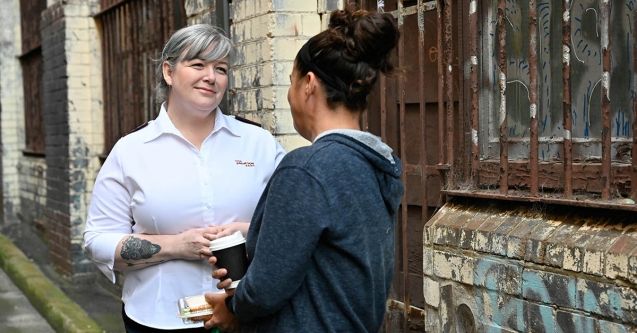Salvos case worker's story of domestic violence
31 May 2022

Those who work for, or are involved with The Salvation Army, are acutely aware that a crisis can happen to anybody, at any time. And it is the care, support and advice given at this crucial time that makes all the difference to recovery.
Sometimes, crisis leads to an ongoing relationship with the Salvos community, as people who were once in need go on to help others by becoming case workers or volunteers themselves. For others, a personal crisis leads to better understanding and a more informed response to those they already serve.
As a long-term case manager at a Salvation Army crisis accommodation centre for women and children, Emily* experienced the same uncertainty, fear and heartbreak as the clients she supported when she became a victim-survivor of family and domestic violence herself. Now, she is using her own experience and insights to help those in need.
“It inspires the work I do. I know firsthand how important it is to see that support is available in that situation,” says Emily.
Lived experience
Emily and her partner were together for many years and had three children when the relationship started to change. A traumatic past left its mark on her partner and after keeping it at bay for a long time, post-traumatic stress disorder began to impact his behaviour and he became controlling and violent.
It began with increasingly erratic behaviour, isolating Emily from friends and family and becoming highly critical of Emily’s appearance and parenting abilities.
“The aggression progressed. One night, he was angry about me wanting to see my friends. He grabbed me by the shoulders and shook me really hard. It was a wake-up call,” says Emily.
“Soon after, he came home really angry. He took my phone off me and told me that if I called the police, he would kill me. I felt he meant it. He threatened to take the kids and never allow me to see them again. He beat me very badly that night. I knew I had to do something. It was terrifying.”
Already working in crisis support and familiar with the stories from other women who had experienced domestic abuse, Emily knew that it often takes a woman several attempts to leave before they leave for good. She knew that if her partner was capable of such a level of violence, he was capable of doing it again.
“When women are leaving and I’m supporting them to move on and talking about respectful and healthy relationships, I need to be practising what I preach. I didn’t want to be a hypocrite, so I found that I had that pressure on myself to move forward. I knew the system and what to do but still found it challenging to take those steps and get my family safe.
“When I told my partner our relationship was over, he pleaded with me, said it wouldn’t happen again. I knew now though, what he was capable of and I couldn’t risk that happening again to me or the kids.”
Emily knew from working in the domestic violence space just how much children are affected, so her primary concern was ensuring her kids were not exposed any further. While they were spared from witnessing their father’s violence, Emily says there had been tension leading up to it. Linking herself into counselling and other supports she was aware of, she also arranged for her kids to attend playgroup for children affected by family and domestic violence.
“[This] let them be able to express how they were processing and dealing with the home environment and the separation because they were quite young. So a lot of my stress was what it might have done to those little kids, getting them in support made me feel more at ease.”
Informed practice
Emily’s own experience with domestic violence has expanded her understanding of the situation and the challenges.
“I don't disclose my experience with violence to clients (for confidentiality), but I think it definitely helps me have a deeper perspective and understanding of how I can support. I acknowledge though that everyone’s journey is different – what was good for me may not be useful for someone else. But it definitely gives me a layered depth of practice having gone through that experience,” says Emily.
In her current role working with women and children, Emily is using trauma-informed and strengths-based practice to support the needs of clients.
“This involves looking at what their story is, what their needs are, help to identify their goals. It's really important with people having experienced domestic violence to be making their own decisions, not told again what they need to do. This process is really important in terms of recovering from it and moving forward.”
Emily works with victim-survivors to provide options for support – this could mean referrals to counselling, connection with victim services, safety assessments and planning, coordinating Apprehended Violence Orders (AVO) with the police or providing clarity around the process, working with domestic violence court advocacy groups, financial counselling referrals, and more. She says, often just implementing all these steps gives women a greater sense of their own safety and empowers them on their road to recovery.
Having been through it herself, Emily wants others to understand that support is out there and they are not alone.
“If you are in an abusive situation, reach out and talk to someone. You may not be ready to leave but listen to what you say out loud when you talk to someone – this can be really helpful. You and your children deserve to be safe. That is the priority. It’s hard, but support is out there, whatever you are deciding to do. And don’t feel scared about crisis accommodation. You can be well-supported and it’s a safe place to take your kids.”
*Name changed to protect privacy
A version of this story first appeared in Salvos Magazine.